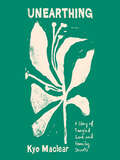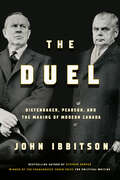Title search results
Showing 1 - 2 of 2 items

Unearthing: A story of tangled love and family secrets
By Kyo Maclear. 2023
DAISY audio (Direct to player), DAISY audio (Zip)
Death and bereavement, Biography, Self help
Human-narrated audio
For readers of Crying in H Mart and Wintering, an unforgettable memoir about a family secret revealed by a DNA…
test, the lessons learned in its aftermath, and the indelible power of love. Three months after Kyo Maclear’s father dies in December 2018, she gets the results of a DNA test showing that she and the father who raised her are not biologically related. Suddenly Maclear becomes a detective in her own life, unravelling a family mystery piece by piece, and assembling the story of her biological father. Along the way, larger questions arise: what exactly is kinship? And what does it mean to be a family? Thoughtful in its reflections on race and lineage, unflinching in its insights on grief and loyalty, Unearthing is a captivating and propulsive story of inheritance that goes beyond heredity. What gets planted, and what gets buried? What role does storytelling play in unearthing the past and making sense of a life? Can the humble act of tending a garden provide common ground for an inquisitive daughter and her complicated mother? As it seeks to answer these questions, Unearthing bursts with the very love it seeks to understand
The Duel: Diefenbaker, Pearson and the Making of Modern Canada
By John Ibbitson. 2023
Braille (Contracted), Electronic braille (Contracted), DAISY Audio (Direct to Player), DAISY Audio (Zip), DAISY text (Direct to player), DAISY text (Zip), Word (Zip), ePub (Zip)
Politics and government biography, Canadian non-fiction
Synthetic audio, Automated braille
One of Canada&’s foremost authors and journalists, offers a gripping account of the contest between John Diefenbaker and Lester Pearson,…
two prime ministers who fought each other relentlessly, but who between them created today&’s Canada. John Diefenbaker has been unfairly treated by history. Although he wrestled with personal demons, his governments launched major reforms in public health care, law reform and immigration. On his watch, First Nations on reserve obtained the right to vote and the federal government began to open up the North. He established Canada as a leader in the struggle against apartheid in South Africa, and took the first steps in making Canada a leader in the fight against nuclear proliferation. And Diefenbaker&’s Bill of Rights laid the groundwork for the Charter of Rights and Freedoms. He set in motion many of the achievements credited to his successor, Lester B. Pearson.Pearson, in turn, gave coherence to Diefenbaker&’s piecemeal reforms. He also pushed Parliament to adopt a new, and now much-loved, Canadian flag against Diefenbaker&’s fierce opposition. Pearson understood that if Canada were to be taken seriously as a nation, it must develop a stronger sense of self. Pearson was superbly prepared for the role of prime minister: decades of experience at External Affairs, respected by leaders from Washington to Delhi to Beijing, the only Canadian to win the Nobel Prize for Peace. Diefenbaker was the better politician, though. If Pearson walked with ease in the halls of power, Diefenbaker connected with the farmers and small-town merchants and others left outside the inner circles. Diefenbaker was one of the great orators of Canadian political life; Pearson spoke with a slight lisp. Diefenbaker was the first to get his name in the papers, as a crusading attorney: Diefenbaker for the Defence, champion of the little man. But he struggled as a politician, losing five elections before making it into the House of Commons, and becoming as estranged from the party elites as he was from the Liberals, until his ascension to the Progressive Conservative leadership in 1956 through a freakish political accident. As a young university professor, Pearson caught the attention of the powerful men who were shaping Canada&’s first true department of foreign affairs, rising to prominence as the helpful fixer, the man both sides trusted, the embodiment of a new country that had earned its place through war in the counsels of the great powers: ambassador, undersecretary, minister, peacemaker. Everyone knew he was destined to be prime minister. But in 1957, destiny took a detour.Then they faced each other, Diefenbaker v Pearson, across the House of Commons, leaders of their parties, each determined to wrest and hold power, in a decade-long contest that would shake and shape the country. Here is a tale of two men, children of Victoria, who led Canada into the atomic age: each the product of his past, each more like the other than either would ever admit, fighting each other relentlessly while together forging the Canada we live in today. To understand our times, we must first understand theirs.